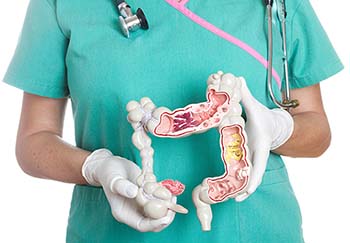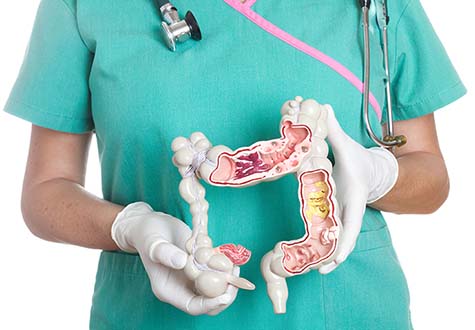
Ann Rigdon says she has the best job in the world. No, she’s not a pilot or a famous singer. She helps people get colorectal cancer screenings.
As the nurse administrative coordinator for the UVA Colorectal Cancer Screening Program, Rigdon educates UVA employees, patients and members of the local community about the importance of regular screenings, and what their screening options are. Her job can quite literally save lives. That’s because regular colorectal cancer screenings can help prevent colorectal cancer entirely.
The Pros of Colonoscopies
For years, colonoscopy was the only colorectal cancer screening option. And it’s been a very effective one.
Colonoscopies don’t just allow for visual inspection of the entire colon and rectum. If doctors find a polyp (an abnormal growth that is sometimes precancerous), they can typically remove it during the same procedure. If the doctor doesn’t find any polyps, you typically won’t need another colonoscopy for ten years.
But colonoscopies aren’t without their drawbacks, and the drawbacks are enough to keep some people from being screened.
Why Some People Don’t Get Colonoscopies
Some of those drawbacks include:
- The preparation process — Your bowels have to be clear of all fecal matter for a colonoscopy, and that process is unpleasant for some.
- Possibility of bad news — Being scared of getting bad news can cause some people to avoid screening entirely.
- Sedation — Colonoscopies require anesthesia, which scares some people.
- Logistics — You might find it challenging to arrange for time away from work and transportation to and from the appointment.
Colorectal Cancer Screening Rates
The National Colorectal Cancer Round Table (NCCRT), an organization dedicated to promoting colorectal cancer prevention and early detection, set a goal in 2014 of having 80 percent of adults aged 50 and older being regularly screened for colorectal cancer by 2018. There has been progress, but the NCCRT reports that rate has only reached about 70 percent so far.
Colonoscopy Alternatives
Enter the colonoscopy alternatives. Several of these have been introduced in the past few years. Rigdon hopes more people will learn about the ease and accuracy of at-home colorectal cancer screening kits and other colonoscopy alternatives. With people of average risk having the option to potentially avoid traditional colonoscopies, the screening rate should continue to climb.
The Best Test?
As far as Rigdon is concerned, the “best” colon cancer screening test for a person to choose is the one they will actually do. Although experts still consider colonoscopies to be the gold standard for colorectal cancer screening, people of average risk do have other options for colorectal cancer screening.
Over 45?
If you’re over 45 and behind on your colorectal cancer screenings, Rigdon’s advice is clear: “Do something, and do it now. Not next year — because next year will be too late for some.”
Some of these even include highly accurate tests that you can do from the comfort of your own home in just a few minutes.
Colonoscopy Alternative Options
According to Rigdon, UVA supports three colonoscopy alternatives. All options have their pros and cons.
CT Colonography
This test happens at an imaging center. It creates and examines a 3D image of your entire colon. While very good at finding large polyps, this scan can miss small polyps. It takes less time than a colonoscopy and no sedation. You’ll have to repeat this screening every 5 years if nothing is found.
Fecal Immunochemical Test (FIT)
This non-invasive, at-home screening kit looks for hidden blood in the stool, which can be an early sign of colorectal cancer. You’ll need to repeat this screening yearly if no blood is found.
FIT-Fecal DNA (Cologuard®)
This prescription-only, FDA-approved stool test identifies altered DNA in your stool, which may indicate colorectal cancer. You complete the test at home, mail in your sample, and your doctor receives the results. This test generally costs more than FIT. Doctors recommend repeating this test every 3 years if no blood or altered DNA is found.
How At-Home Colorectal Screening Kits Work
At-home colorectal cancer screening tests are stool-based tests. They look for microscopic amounts of blood in the stool, which can be a sign of abnormalities in your colon or rectum.
You can only get these at-home screening tests with a prescription. Many doctors’ offices stock them, but you can also get them from a pharmacy or by mail.
Getting the Sample
Once you have your kit, it’s time to test. The kit includes everything you need and the process takes just a few moments. When you’re ready to have a bowel movement:
- Place a piece of tissue over your toilet to collect stool during the bowel movement
- Dip a wand into the passed stool
- Seal that wand inside a tube
- Mail it in for testing
- Your doctor will receive the results
If Your Screening Comes Back Positive
If any of these alternative screenings come back positive, you’ll need to have a colonoscopy. Rigdon advises, “If you’re going to choose a colonoscopy alternative, you need to agree that if your results come back positive, you won’t bury your head in the sand. You need to agree that you’ll follow up with a colonoscopy.”
Choose Your Colorectal Cancer Screening Option
Get started by having a conversation with your primary care provider.
Insurance Considerations for At-Home Colon Cancer Screening Kits
If you’re thinking about choosing an at-home screening kit, you may want to make a call to your insurance company first.
The Affordable Care Act mandated that insurance carriers cover colorectal cancer screening tests for people over 45, including colonoscopies. However, if you choose a colonoscopy alternative and it comes back positive, your health insurance may not cover all costs.
The reason? While companies must cover screening colonoscopies in full, they don’t have to pay for diagnostic colonoscopies. An at-home test qualifies as a screening procedure. But if you then need a follow-up colonoscopy, that falls into the diagnostic category. Check your insurance coverage to decide which screening option works best for you.
If you’re over 45 and behind on your colorectal cancer screenings, Rigdon’s advice is clear: “Do something, and do it now. Not next year — because next year will be too late for some.”
